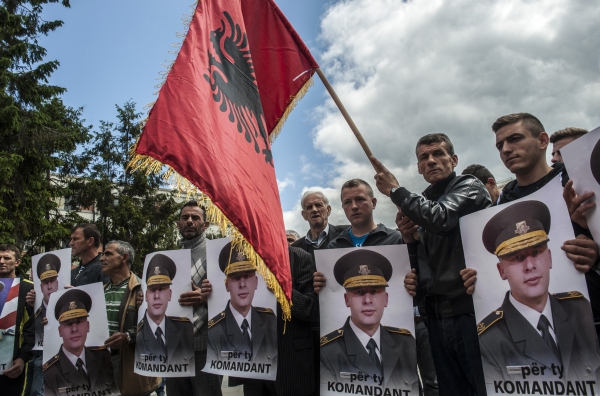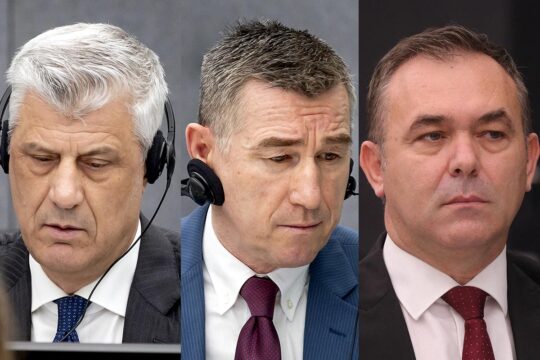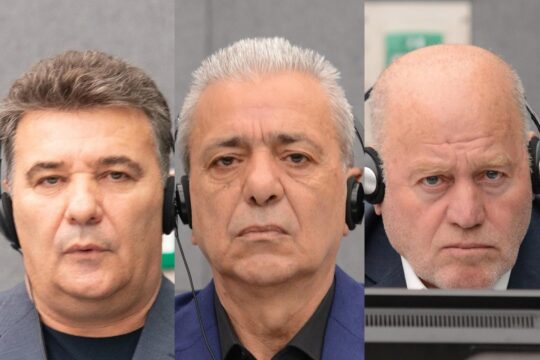In a few days, the 19 judges of the Kosovo Specialist Chambers (KSC), a European Union initiative ratified by Kosovo’s parliament in 2016, will have their own Rules of Procedure and Evidence. In theory, everything will then be ready for the first indictments against the Kosovo Liberation Army (UCK) for war crimes and crimes against humanity committed between January 1, 1998 and December 31, 2000. The Specialist Chambers are an integral part of Kosovo’s judicial system, but they have an international presence and they sit in The Hague, Netherlands. The President is Bulgarian, the Prosecutor is American, and none of the staff come from the region concerned. But despite these precautions, 20 years after the crimes were committed and after years of international community failings on Kosovo, the KSC’s mission looks impossible.
“If that were so, I wouldn’t be here,” smiles American KSC Prosecutor David Schwendiman. He projects tranquil determination, whilst revealing nothing that might make Belgrade and Pristina hold their breath in coming months -- no dates, nor clues about the content of future indictments. “We are continuing our investigation,” he said in an interview with JusticeInfo. “Judges are not going to be influenced. I am not going to be influenced. We are going to find the facts, and we are going to make the right decisions and we are going to pursue the result of these decisions…aggressively.”
In 2014, head of investigations Clint Williamson said as he handed over to Schwendiman that he had received evidence of “a campaign of systematic persecution of minorities” led by UCK leaders from June 1999, which justified pursuing the authors for crimes against humanity. The investigation team was given a mandate after a report by Swiss Senator and jurist Dick Marty. Working under a mandate from the European Council, Marty confirmed that there had been trafficking in human body organs taken from Serbian prisoners in Albania, as denounced also by Carla del Ponte, former Prosecutor of the International Criminal Tribunal for the former Yugoslavia. On this, Clint Williamson explained that he had not yet collected enough evidence for a trial. David Schwendiman is a lot less talkative, but says he wants to tackle these cases: the targets, content, witness protection and cooperation from States. Justice will take the time it needs, he says.
17 years of international community failure
It will also take time before the Specialist Chambers can move into the building allocated by the Dutch government, since its rehabilitation is likely to take another 18 months. “There’s no-one here except workmen,” smile a handful of yellow-jacketed men sawing at a spruce tree. Part of the building, which will house the international judges, was erected over the ruins of the Atlantic wall built by the Nazis during the Second World War. It is only a short distance from the prison that long housed former Yugoslav president Slobodan Milosevic, against whom the UCK separatists fought. People are already commenting that the building is like a “Harry Potter house”. But magic is unlikely to work in the future cases of the Specialist Chambers. In 17 years, the international community has only handed down some 20 verdicts for crimes committed during the war that pitted Belgrade against Kosovar-Albanian rebels and which was ended by a NATO intervention. The conflict left some 13,000 people dead, and many families are still looking for the 1,700 who disappeared. In 2017, the international context seems more conducive to such justice, and investigations have now gone too far to envisage abandoning the effort. Americans and Europeans long opposed ICTY trials against separatist leaders but now have fought hard for the creation of the Specialist Chambers, a tribunal that is to work under Kosovo law but be internationalized. It was necessary to “protect as much as possible Kosovo’s dignity in the eyes of the international community,” says one informed analysis, and also “keep the Marty report out of the United Nations Security Council”, so as to avoid political games by Russia and the US. It would be unthinkable to see judges from Russia, backer of Serbia, on the bench trying the separatists, or to have light shone on US links with the former rebellion.
"Swimming in a political sea"
The agreement setting up the Specialist Chambers was nevertheless ratified by Kosovo’s parliament in 2016. “I understand that I am swimming in the political sea but I can’t allow that to affect anything,” says David Schwendiman. Alan Tieger puts his head into the prosecutor’s office. He is the one that will lead the future trials. And it was he that helped put former Bosnian Serb political leader Radovan Karadzic behind bars for the next 45 years. Other former staff of the International Criminal Tribunal for the former Yugoslavia (ICTY) have also come to the Specialist Chambers. They have experienced the successive failures of trials against UCK leaders including Ramush Haradinaj and Fatmir Limaj, who were both acquitted. This stain on the legacy of the ICTY was at the time rubber-stamped by the international community, especially the US, which did not want trials against the man who was then Prime Minister, or leaders of the former rebellion. The ICTY suffered from interference at all levels and did not get cooperation, even from Russia. The Prosecutor of the Specialist Chambers has real police powers, which is so far unprecedented in international justice. “I can go to every government and ask for assistance,” asserts David Schwendiman. “And I can say, without exception, that we have had good assistance with the States when required.”
But in Belgrade, Natasa Kandic of the Humanitarian Law Center has doubts. “Chambers is a Kosovo court, not an international court,” she says. “Serbia stopped communication with local prosecutors, because Serbia does not recognize Kosovo as a State. A new example is the request of Serbia for extradition of Haradinaj.” As if signalling protests to come, thousands of Kosovars demonstrated in Pristina against France’s arrest of former Kosovo Prime Minister Ramush Haradinaj on January 4 under an arrest warrant from Serbia, which wants his extradition. A French court is due to decide on April 27.
Pressure on witnesses
Haradinaj was twice acquitted by the ICTY for lack of evidence. During the case, nine witnesses were killed. Since the end of the war, witnesses have been subject to bribery attempts, intimidation and elimination. This is the biggest challenge for the Specialist Chambers, more than political influence. This is why the court is sitting outside Kosovo and why it is not employing any staff from the region. An April 2014 letter from the Kosovo President to the European Union says that all sensitive documents will be stored safely only outside the country. The files were transferred secretly in summer 2016 from Brussels, where the preliminary commission of inquiry was, to the Chambers in The Hague.
The Marty report points the finger explicitly at current Kosovo President Hashim Thaçi and other political leaders, including the National Assembly president Kadri Veseli. Their indictment would cause a political storm in the country. “I am not ignorant of the impact, but I am not guided by it,” asserts Schwendiman. Like Natasa Kandic, several people in the region say the system of witness protection put in place so far seems to be more efficient than ever before. “This time, we do not see the names of the witnesses in the newspaper,” comments Natasa Kandic. “It means that they have good protection.”
Elusive reconciliation
Hashim Thaçi recently mooted creation of a Truth and Reconciliation Commission. The timing “could be seen as a political calculation rather than something aimed at meaningful social change”, says Nora Ahmetaj of the Research and Documentation Center in Pristina. “If the president wants to establish a commission as part of some political bargaining between him and the international community under the pretext of stability and peace, then I can confidently say it is doomed to fail.”
“Regional leaders don’t want to deal with the past, and the EU does not have a strategy on how to deal with the past in the Balkans,” says Natasa Kandic. “They focus on new messages: stability, peace, but not reconciliation. Specialist Chambers is very important. But the Albanian Kosovo community is not satisfied, Serbia has stopped trying Serbian perpetrators and there is no reaction from the EU.” Since 2006 Kandic has been calling for RECOM, a proposed regional commission to establish the facts in former Yugoslavia, initiated by three NGOs -- Humanitarian Law Centre, Documenta and the Research and Documentation Center. Nora Ahmetaj says the issue of missing persons should be tackled more seriously. “In addition, in order to increase the efficiency of the war crimes proceedings, it is mandatory that there is a transparent and official cooperation between the Kosovar and Serbian court authorities,” she continues. “This topic must be included in the dialogue between Pristina and Belgrade, and the EU could have played crucial role here.”
In The Hague, the Prosecutor is not promising reconciliation. “The responsibility I feel is not to the States, nor even the EU, it is to do it right and well,” he says. “It’s key for everything. It’s key to ensuring that this is a legitimate court.”






